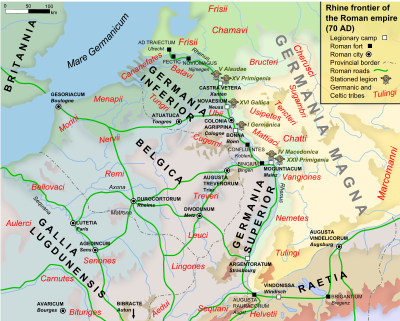
Mattiaci
Encyclopedia

Chatti
The Chatti were an ancient Germanic tribe whose homeland was near the upper Weser. They settled in central and northern Hesse and southern Lower Saxony, along the upper reaches of the Weser River and in the valleys and mountains of the Eder, Fulda and Weser River regions, a district approximately...
, their Germanic
Germanic peoples
The Germanic peoples are an Indo-European ethno-linguistic group of Northern European origin, identified by their use of the Indo-European Germanic languages which diversified out of Proto-Germanic during the Pre-Roman Iron Age.Originating about 1800 BCE from the Corded Ware Culture on the North...
neighbors to the east. The Mattiaci were settled on border of the Roman Empire
Roman Empire
The Roman Empire was the post-Republican period of the ancient Roman civilization, characterised by an autocratic form of government and large territorial holdings in Europe and around the Mediterranean....
on the right side of the Rhine in the area of present-day Wiesbaden
Wiesbaden
Wiesbaden is a city in southwest Germany and the capital of the federal state of Hesse. It has about 275,400 inhabitants, plus approximately 10,000 United States citizens...
(Aquae Mattiacorum), the southern Taunus
Taunus
The Taunus is a low mountain range in Hesse, Germany that composes part of the Rhenish Slate Mountains. It is bounded by the river valleys of Rhine, Main and Lahn. On the opposite side of the Rhine, the mountains are continued by the Hunsrück...
, and the Wetterau
Wetterau
The Wetterau is a fertile undulating tract, watered by the Wetter, a tributary of the Nidda River, in the western German state of Hesse, between the hilly province Oberhessen and the north-western Taunus mountains....
.
Tacitus
Tacitus
Publius Cornelius Tacitus was a senator and a historian of the Roman Empire. The surviving portions of his two major works—the Annals and the Histories—examine the reigns of the Roman Emperors Tiberius, Claudius, Nero and those who reigned in the Year of the Four Emperors...
relates that they were not required to pay tribute to the Romans but were to provide assistance in war and thus were an outpost of Roman rule on the border with Germania. He refers to them in his Germania
Germania (book)
The Germania , written by Gaius Cornelius Tacitus around 98, is an ethnographic work on the Germanic tribes outside the Roman Empire.-Contents:...
(ch 29) in relation to the Batavians
Batavians
The Batavi were an ancient Germanic tribe, originally part of the Chatti, reported by Tacitus to have lived around the Rhine delta, in the area that is currently the Netherlands, "an uninhabited district on the extremity of the coast of Gaul, and also of a neighbouring island, surrounded by the...
:
[The Batavians] are not under the contempt of paying tribute, nor subject to be squeezed by the farmers of the revenue. Free from all impositions and payments, and only set apart for the purposes of fighting, they are reserved wholly for the wars, in the same manner as a magazine of weapons and armour. Under the same degree of homage are the nation of the Mattiacians. For such is the might and greatness of the Roman People, as to have carried the awe and esteem of their Empire beyond the Rhine and the ancient boundaries. Thus the Mattiacians, living upon the opposite banks, enjoy a settlement and limits of their own; yet in spirit and inclination are attached to us: in other things resembling the Batavians, save that as they still breathe their original air, still possess their primitive soil, they are thence inspired with superior vigour and keenness.
With the Chatti, the Mattaci took part in the Revolt of the Batavi in 69 A.D.
69
Year 69 was a common year starting on Sunday of the Julian calendar. At the time, it was known as the Year of the Consulship of Augustus and Rufinus...
, besieging the Roman city of Mogontiacum (present-day Mainz
Mainz
Mainz under the Holy Roman Empire, and previously was a Roman fort city which commanded the west bank of the Rhine and formed part of the northernmost frontier of the Roman Empire...
).
The Notitia Dignitatum
Notitia Dignitatum
The Notitia Dignitatum is a unique document of the Roman imperial chanceries. One of the very few surviving documents of Roman government, it details the administrative organisation of the eastern and western empires, listing several thousand offices from the imperial court down to the provincial...
, an early 5th century document, lists two auxilia palatina
Auxilia palatina
Auxilia palatina were infantry units of the Late Roman army, first raised by Constantine I as part of the new field army he created in about 325....
, the Mattiaci seniores and the Mattiaci iuniores. The references imply Mattiaci in Roman service.
See also
- ChattiChattiThe Chatti were an ancient Germanic tribe whose homeland was near the upper Weser. They settled in central and northern Hesse and southern Lower Saxony, along the upper reaches of the Weser River and in the valleys and mountains of the Eder, Fulda and Weser River regions, a district approximately...
- BataviansBataviansThe Batavi were an ancient Germanic tribe, originally part of the Chatti, reported by Tacitus to have lived around the Rhine delta, in the area that is currently the Netherlands, "an uninhabited district on the extremity of the coast of Gaul, and also of a neighbouring island, surrounded by the...
- List of Germanic peoples

